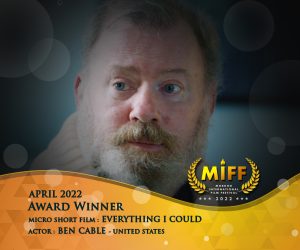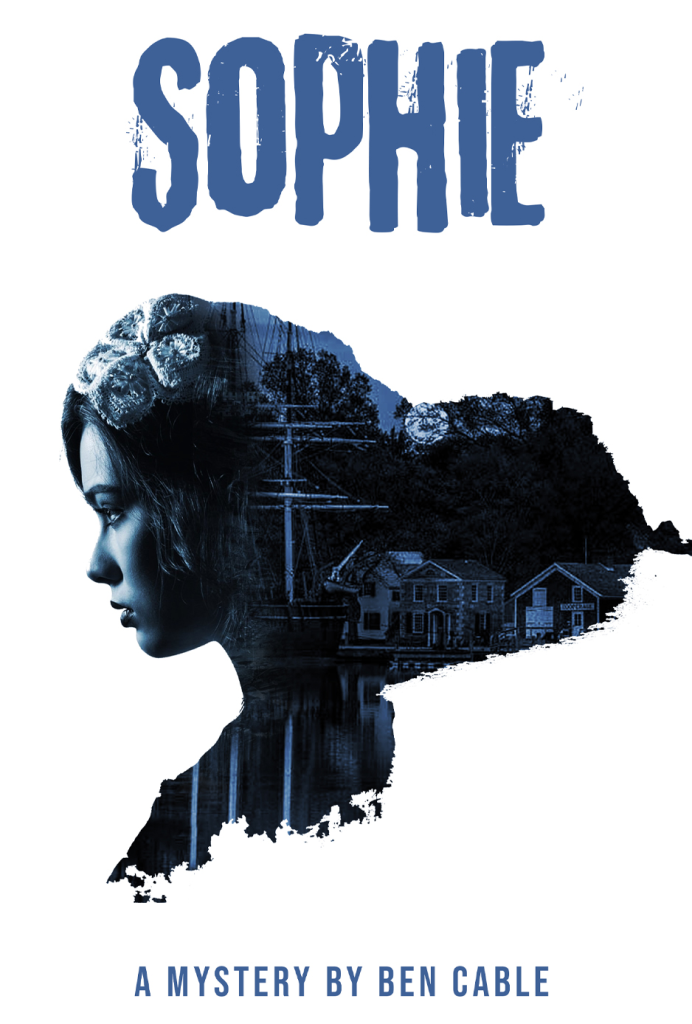Best Actor Awards









Reviews
Watchout International Film Festival
Depression or any other serious mental illness is not only a source of pain for the patient. It can also be a burden on their family or caretakers. Often the caretakers of these patients build up a sort of frustration and resentment after years of coping with it. And even after taking all kinds of care and providing everything that they could, these family members lose everything, including the trust of their family. ‘Everything I Could’ shows the story of a man like this, who has been doing everything that he could for his wife and children for a long time. Yet he is being misunderstood and blamed after his wife left.
The substantial importance of maintaining mental health and stability is quite well-known in the current times. The sanity of family members often needs to be maintained at huge costs. And yet, the blame falls onthe caretakers if they fail. Within a short span of one-and half minutes, ‘Everything I Could’ succeeds in showing this blatant andcruel reality.
The microfilm shows the perspective of a father who is getting blamed by his daughter for his wife’s passing. He earnestly tries to explain to her that he had done everything, taken every step that hecould to ensure the well-being of his family, and yet failed. But the daughter is unmoved. The helplessness of a father who is handling the grief of his wife and the accusations by his daughter, is portrayed heart-wrenchingly.
The viewers are reminded of the harsh reality of our times, where deteriorating mental health is snatching away hundreds of lives, and breaking people and families.
Actor Ben Cable, who plays the protagonist of this microfilm, has given a stellar performance and driven home the point of the film within a very short time with his outstanding acting capabilities. He has single handedly elevated the film and succeeded in showing this complicated character of a father, within such a short time. Ben tackles the role of a father who loses his wife and gets blamed by his family with excellence and empathy.
‘Everything I Could’ throws a lot of questions at us and makes us think. The film is a social commentary on the alarming rate of increase in mental illnesses, and how so many families suffer because of it. The realistic humaneness of the film shows an honest effort from the filmmakers in narrating an uncomfortable reality, which we are enduring every day.
Red Dragon Creative Awards May 2022
Maintaining mental health and stability is proving to be one of the biggest challenges these modern times are throwing at us. People are doing everything they can to maintain the sanity and sanctity of their close ones and still fail dreadfully. “Everything I could” is a similar story of a father who is trying to save his family from the clutches of mental illness, and failing. His failure is not due to any lack of effort from his side, and yet he is the one to be blamed after his wife left.
This micro short film is a social commentary on the alarming rate in which mental illnesses are spreading. The lead actor, Ben Cable has given a stellar performance within a short span of 1 minute 22 seconds and has single-handedly elevated the quality of the film by a notch. His character of a loving and dedicated father, misunderstood by his children, was hard to portray within such a short period but Ben has brought such realistic humaneness to his character that the viewer will empathize with him immediately. All in all, “Everything I could” shows an honest effort inpresenting an issue which is plaguing so many people around the world right now and does a remarkable job at it.
Review from AIFF jury
This short piece of work is not something typical we are used to see on our screens. Usually when we think of families with one parent, we imagine single mother trying to make ends meet for her kids. This work is the rare and pleasant exception from this rule as it tells the story about single father of two kids.
In the shortest period of time, we see just two characters: father and his daughter having a conversation and here we see that dialogues about the eternal are actually a vulnerable position. Father is trying to figure out what is happening to his teenage daughter and how she feels. The topic of vulnerable and emotional men is brought up. Men can feel helpless and clueless in the theme of a family too. In this journey through the struggles and trials that single father must take the real side of hard work and integrity.
Also, this short piece of work brings awareness about mental health and mental illnesses. Sometimes actions of our loved ones are made towards their own happiness and not happiness of people who surround them. That’s what the girl’s mother did – she left for her own good and that is also okay.
This work is shot in blue and green undertones to highlight the burdensome of this short dialog. What is important it doesn’t go way too deep into cold colors and doesn’t give an unnecessary melancholic aftertaste to the piece of work.
Director uses simple the 180-degree rule while filming dialogs and it makes it easier for viewers to understand relationships between characters and enables the audience to visually connect to the happening on the screen.
The Importance of Recongnizing Limitations Inoneself and In others
Approximately 10% of the entire world population suffers from mental illnesses; this equates to about 720 million people. These illnesses can range from bipolar disorder, obsessive-compulsive disorder (OCD), eating disorders, anxiety disorders, schizophrenia, somatization, and many dermatological and cardiovascular problems. Depression is considered one of the most serious diseases of the century. It is the second most common cause of disability worldwide, second only to severe back problems, and should be dealt with as a priority by global public health. Depression usually leads to dependence on drugs such as alcohol and smoking, used as a form of escape. With this knowledge and sensitivity, director Christopher Armienti creates a compelling dialogue between a father (Ben Cable) and his daughter (Sierra Nowak) in an attempt to explain his wife’s mental illness. In a little less than two minutes, the interaction between Luke and Sarah Nottingham (played, respectively, by Cable and Nowak) brings to the screen the great delicacy that the text demands, and that is elevated even more by the glances and voices of the duo of protagonists. The uncomfortable but necessary conversation begins with a family confrontation: Sarah’s school performance is declining, a common symptom in young people going through family situations that demand a lot of maturities. Luke, worried about his daughter, knows the probable root of the problem; and then decides to start this emotional and hard conversation. The text, at no point, becomes robotic or automatic. The lines and expectations we are presented with on-screen feel genuine, as if, while observing the conversation behind closed doors between father and daughter, we were voyeurs, invading the privacy of this family while the patriarch tries to deal with the difficulty of showing his daughter that, unfortunately, he is not infallible, and that in reality, no one is. Taking care of people with mental and psychological disorders is a huge challenge; it can escalate into a snowball, turning previously healthy caregivers into people who are just as sick as those being treated. Perhaps this is the lesson Luke has learned and triesto pass on to his daughter in their brief but profound conversation. “I did everything I could to keep this family together,” the heartbroken father confides to his hurting daughter. To have the ability to see in others the need for more significant help, and at the same time to accept that this help is not something that is within your reach is something that indeed demands a great deal of emotional intelligence. Much more when dealing with family members. In his emotional performance, Ben Cable portrays very well this confessional moment. In this sincere conversation where reason and emotion go hand in hand in the emission of words, the protagonist doesn’t take his eyes off his daughter, to evidence the abysmal sadness in which he finds himself in the twinkling of his irises. Born in Bridgeport/Connecticut, Ben returned to acting in 2017 after a long hiatus away from creating and playing characters and delivers alongside Sierra Nowak a wonderful piece of work. The very short narrative is further enhanced by Frankie Galvez’s graceful cinematography and Carter Imperial’s accurate sound design, making the experience of watching the film a mixture of commotion, with a sense of wondering what will happen next. The anticipation is coupled with the voyeuristic tendency to keep following the relationship between the Nottinghams. To know whether the father will try to console his daughter with words of affection or with a silent hug. Or whether Sarah will rebel against the patriarch’s decision to go after her mother. Among many others “what ifs…” that leave the narrative so rich in possibilities, elevating the cinematographic diegesisto new interpretative levels. At the same time, the film provides the audience with the desire to keep up with the Nottingham family. “Everything I Could” is conquering its space in film worldwide festivals. For example the “Medusa Film Festival” (in which it won the award for Best Drama Short), the “Odyssey Fest”, the “So You Think You Can Direct – Act Competition”, and now the “BIMIFF – Brazil International Monthly Independent Film Festival”.
Review by Richard Caeiro
It does not have any presentation titles or any technical clarification, it lasts just 1 minute 34 seconds, the camera only records a conversation between a father and a son that is almost a monologue of the father. But“Don’t Be Afraid” breaks with a lot of cinematographic structures, and perhaps without meaning to. A lot of people know what concept art is all about, but it’s worth remembering. When the support or the final result of a work of art is of no importance, and the only thing that matters is the message, that is called conceptual art, because the concept is the only thing that matters and not even the quality of the invoice.
This short film is pure conceptual cinema. Innovative par excellence. Some fans will remember the films of Von Triers, the Dane who directed “Melancholia”, the one who made Nicole Kidman walk on a town drawn on the floor in “Dogville”. Well, the idea of conceptual cinema is to make cinema in any way, with whatever is at hand. The only thing that matters is the idea. In any case, the smooth movement of the camera at the beginning, the lighting and the framing are perfect.
Ben Cable shows us, perhaps the fragment of a longer talk, where he talks about an upcoming protest and fears. The talk is political to the extent that almost all talk is political. But I don’t want to tell that talk because it deserves to be seen and heard, especially at a time when nothing seems to work to solve fundamental things.
“Don’t Be Afraid” won the prize for the best political short film at the festival. Very deservedly.
A father and son meet at a diner for a serious heart-to-heart in Ben Cable’s short film, Don’t Be Afraid. Running at a brisk minute-thirty, Hank (Ben Cable) talks to his son Ben (Christopher Michael Rose) about what protests were like…back in his day. Not so long ago, protests were dangerous, but Ben reminds him, “…not for the allies.” Either way, everyone came together to stand up for a common cause.
With a short film that ends so quickly, it’s hard to critique its filmmaking technicals appropriately. Though filmmaker Cable doesn’t speak to a specific issue, the storytelling of Don’t Be Afraid speaks directly to what compels us to protest and accept the consequences for standing up for what we believe is right.



















